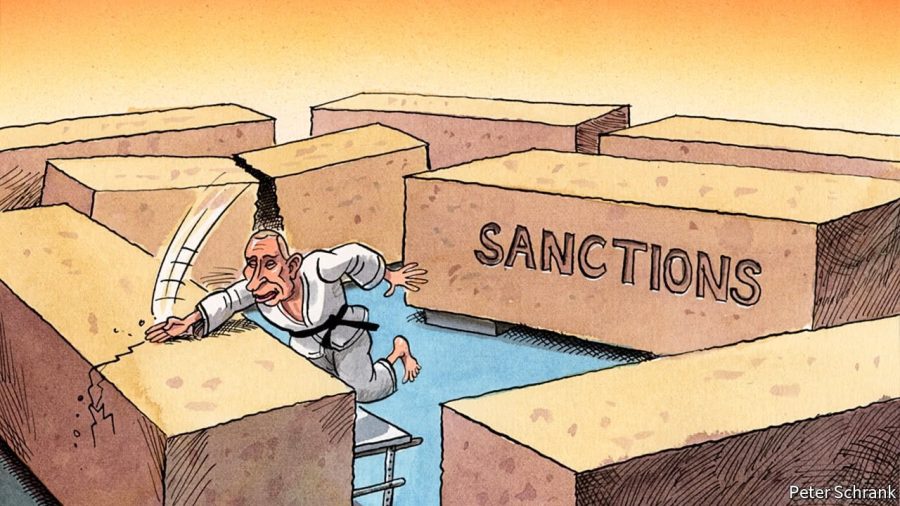Ukraine’s allies enact economic sanctions against Russia
Nations begin a financial war to weaken Russia after they invasion of Ukraine.
The Russian invasion of Ukraine marked the beginning of the largest European military conflict since World War II. Though the outbreak of nuclear war remains extremely unlikely, the threat of military escalation combined with Vladimir Putin’s threat of “severe consequences” for countries that attempt to intervene has stopped many nations from engaging with Russia in direct military conflict. Instead, many nations, including the United States, have begun to use economic sanctions in an attempt to persuade Russia to back down.
Before looking at sanctions themselves, it is important for one to look at the roots of the Russo-Ukrainian conflict. The Soviet Union was founded in 1922, and during the years of its existence, its leaders attempted to extend its global influence and spread communism throughout the world. The United States and other capitalist nations, afraid of the rapid expansion taking place, began to attempt to interfere with the goals of the Soviet Union and stop further expansion. Though this interference came in many forms such as proxy wars and the arms race, one of the most vital decisions made at this point was the creation of NATO (North Atlantic Treaty Organization). NATO is an international military alliance that currently consists of thirty nations. If any member nation were to be attacked, the treaty dictates that the other members would come to its defense. NATO was created largely in response to the formation of the Eastern European Bloc, a large chain of European nations under the control of the Soviet Union, which divided western, largely capitalist nations from the soviet nations found further east.
Though the USSR dissolved on December 26, 1991, NATO has continued to exist and expand. Russia views the existence of NATO as a threat and has always felt somewhat ostracized from the rest of Europe. Russia’s sentiment of Western Europe’s encroachment came to a head as talks began of Ukraine, a former Soviet state, potentially joining NATO. This decision would have meant that an increased number of defensive weapons would likely be placed on the Russian-Ukrainian border, a border that had already been heavily militarized. Russia, fearing this possibility, decided to invade Ukraine and regain some control of the situation.
The current invasion brings us back to sanctions. Sanctions are a form of economic penalties inflicted upon a country. In this instance, allies of Ukraine are cutting off commerce and finances with Russia in order to severely damage their economy. So far this goal has been working astonishingly well. The value of the Russian ruble has fallen to one one-hundredth of the value of the U.S. dollar, and the economic blackout facing Russia has many predicting an economic collapse. These sanctions have been specifically designed to hurt Vladimir Putin and the affluent, powerful oligarchs that surround him.
The theory is that if enough economic damage affects the country, Russia will have to back down. However, the effects of sanctions are known to affect lower-class citizens who are economically vulnerable. This is problematic for a few reasons. First, this is an unethical decision because of the immense harm it will create for innocent Russian civilians.
Commentators have said that this suffering could cause more and more discontent civilians to rise against their dictatorial government, but this could very well be a lapse in judgment. While the true amount of Russian support for the invasion is unclear, there remain largely two camps of viewpoints. On one side, some Russian citizens are unhappy with the decision to invade, and on the other, there are citizens that believe the United States and its allies have driven Russia to this decision. Russian media is heavily skewed and censored which presents Russia as a beacon of light while they present Russia’s enemies as hellbent on destroying Russia. These economic sanctions could feed into the false narratives being propagated by Russian media, and drive Russian citizens to feel personally subjugated by Russia’s enemies. Additionally, Russia has been notorious for its violent suppression of anti-government protests which makes it even harder for lower-class citizens to speak out against injustice. These demonstrations have already been violently disrupted by Russian authorities who made at least 8,000 arrests of protestors between February 24th and March 4th.
The upsetting reality is that there is no real ‘right’ solution to solving the Russo-Ukrainian conflict. In the meantime, I urge those who can to donate to charities supporting Ukrainians affected by the devastating conflict.


